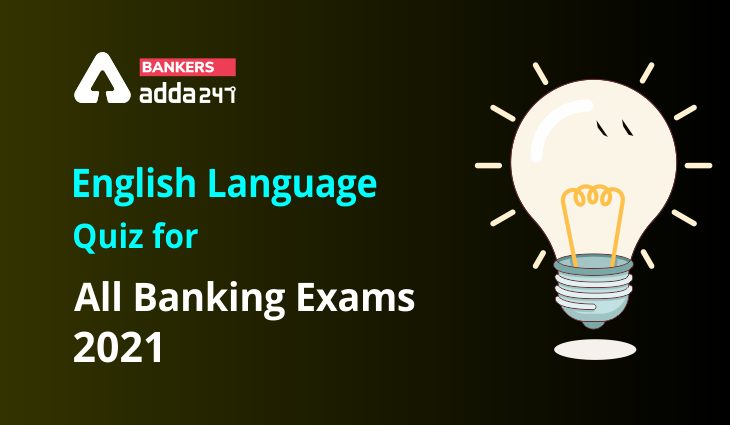Directions (1-12): Find out the error in each of the following sentences, if there is no error, answer is (e). Avoid punctuation mistakes (if any).
Q1. The Battle of Barnet of 1471 was (a)/ lead by Edward of the (b)/ House of York against (c)/ the House of Lancaster (d)/ no error (e)
(a) a
(b) b
(c) c
(d) d
(e) e
Q2. (a) Whenever /(b) she is coming to our house /(c) she brings a lot of /(d) chocolates for the kids /(e) No error
(a) a
(b) b
(c) c
(d) d
(e) e
Q3. (a) Rahul uses to watch/(b) web series till eleven O’clock at night /(c) and then goes /(d) to bed /(e) No error
(a) a
(b) b
(c) c
(d) d
(e) e
Q4. They bought the house (a) / in 2006 and they did (b)/ a lot of work (c) / on it since then. (d) / no error (e)
(a) a
(b) b
(c) c
(d) d
(e) e
Q5. He neglects (a)/ his research (b)/ these days without any (c)/ derived conclusions. (d) / no error (e)
(a) a
(b) b
(c) c
(d) d
(e) e
Q6. A misogynist is a person (a)/ who is hating women or (b)/ believes that men are (c)/ much better than women. (d) / no error (e)
(a) a
(b) b
(c) c
(d) d
(e) e
Q7. (a) A drop in the mercury column /(b) of a barometer /(c) indicates the change /(d) in atmospheric pressure /(e) No error
(a) a
(b) b
(c) c
(d) d
(e) e
Q8. It is appearing that (a)/ by the 4th century (b) /the land was already (c)/ starting to deteriorate. (d) / no error (e)
(a) a
(b) b
(c) c
(d) d
(e) e
Q9. Whenever an expectation will fail, (a) /the agent interacts with users, (b)/ presenting its rationale (c) /for its expectation. (d) / no error (e)
(a) a
(b) b
(c) c
(d) d
(e) e
Q10. If I will find (a)/ my books, (b) /I’ll give (c) /them to you. (d) / no error (e)
(a) a
(b) b
(c) c
(d) d
(e) e
Q11. “Here he is coming again!”,(a)/ said Manisha (b)/ when she (c)/ saw him. (d) / no error (e)
(a) a
(b) b
(c) c
(d) d
(e) e
Q12. The stars, planets and galaxies (a)/ that can be detected made up (b)/ only 4 percent (c) /of the universe. (d) / no error (e)
(a) a
(b) b
(c) c
(d) d
(e) e
Directions (13-15): Fill in the blanks with the right option.
Q13. You are late. The client ______ already.
(a) left
(b) has left
(c) will leave
(d) had left
(e) leave
Q14. Abhilasha is always asking questions. Sometimes she ______ such complicated questions that I ______
puzzled, too.
(a) asks; becomes
(b) asks; become
(c) is asking; become
(d) asks; became
(e) ask; become
Q15. The NGO ______ a food-and-fun fair next month to _______ money for the building-fund.
(a) will hold; raise
(b) will be holding; raised
(c) holds; raise
(d) will hold; rise
(e) is holding; raise
Practice More Questions of English for Competitive Exams:
English for Competitive Exams |
Basic English Language Quiz for All Banking Exams- 28th April |
Basic English Language Quiz for All Banking Exams- 27th April |
Solutions
S1. Ans. (b)
Sol. ‘led’ should be used in place of ‘leads’ since this a past event and past events (histonic ones) are expressed in simple past tense
S2. Ans. (b)
Sol. ‘She comes’ should be used in place of ‘she is coming’ since present habits are expressed in ‘Simple Present Tense’ For Ex –: Whenever she weeps, nobody asks her the reason.
S3. Ans. (a)
Sol. ‘Watches’ should be used in place of ‘uses to watch’ since present habits are expressed in ‘Simple Present Tense’
For Ex –:He goes for a walk every day, before having his tea in the morning
S4. Ans. (b)
Sol. “they did” should be replaced by “they have done” as when the main verb in a sentence with a since clause or a since phrase (since then) refers to a period of time including the present, a present perfect tense or present perfect continuous tense is necessary.
S5. Ans. (a)
Sol. “He neglects” should be replaced by “he is neglecting”. Note that for longer actions that may be taking place for a temporary period only, we can use the present continuous tense to describe them. It can be used for any temporary situation, no matter how long or short it is.
S6. Ans. (b)
Sol. “who is hating” should be replaced by “who hates” as to express general truths, we always use simple present tense.
S7. Ans. (e)
Sol. No error
S8. Ans. (a)
Sol. “it is appearing” should be replaced by “it appears that”. Note that while using “appears” in the sense of “seems”, we always use simple tense, instead of continuous tense.
S9. Ans. (a)
Sol. “Whenever an expectation will fail,” should be replaced by “Whenever an expectation fails” as we use simple present to denote actions of habitual nature.
S10. Ans. (a)
Sol. “If I will find” should be replaced by “If I find” as in case of first conditional sentence i.e., when it is possible and also very likely that the condition will be fulfilled, we use If + simple tense (If-clause), future tense (main clause).
S11. Ans. (a)
Sol. “Here he is coming again!” should be replaced by “Here he comes” as we use simple present tense for the sentences that begin with “here” or “there”.
Ex. Here comes the train!
S12. Ans. (b)
Sol. “made up” should be replaced by “make up” as simple present tense is used to describe the universal truths or facts.
S13. Ans. (b)
Sol. The usage of the word ‘already’ shows that the action in the given sentence has been completed hence perfect tense should be used. Now, the usage of are in the first part of the question shows that the sentence is in present tense. Therefore, (b) is the correct option
S14. Ans. (b)
Sol. The given sentence shows the habits of Abhi hence, simple present tense should be used in the first blank. In the second blank, present tense should be used, now I is plural in present tense, hence plural verb (become) should be used here. Hence (b) is the correct option.
S15. Ans. (e)
Sol. (e); ‘is holding; raise’ is the correct option. ; For future plans which are expected to be executed in near future, we use present progressive tense.
Look at the meaning of the following options for the second blank.
Raise: Increase the amount
Rise: An upward movement
Hence, (e) is the correct option.
Click Here to Register for Bank Exams 2021 Preparation Material




 English Language Quiz For Bank Foundatio...
English Language Quiz For Bank Foundatio...
 English Language Quiz For SBI Clerk Prel...
English Language Quiz For SBI Clerk Prel...
 English Language Quiz For SBI Clerk Prel...
English Language Quiz For SBI Clerk Prel...









